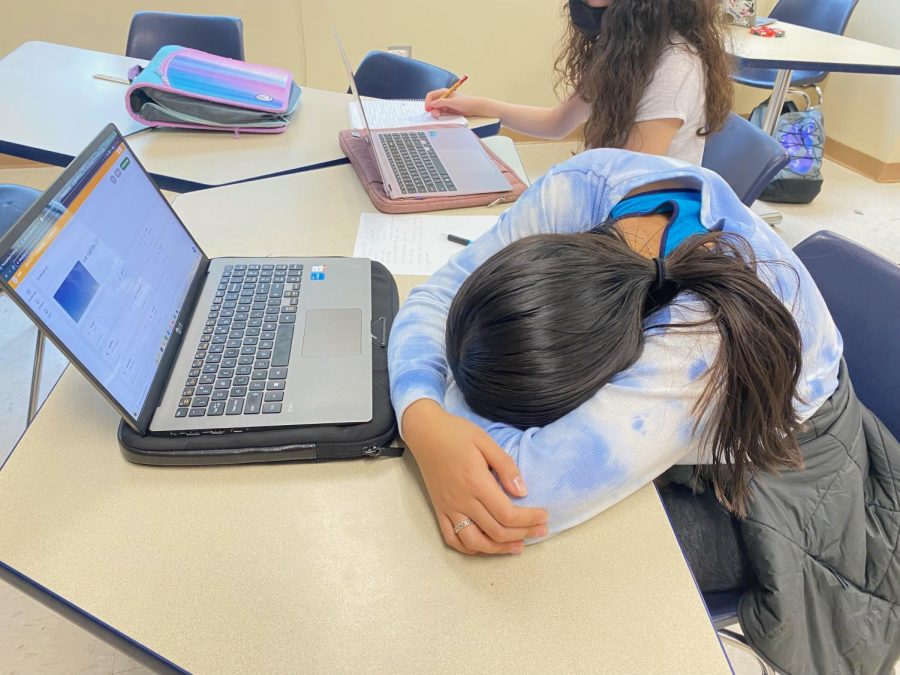In honor of National Sleep Awareness Month, here are some tips to improve your sleep schedule
Many CESJDS students have found themselves dozing off in class recently. With such busy schedules, it is difficult to get on a healthy sleep schedule, though, there are some things that you could do to improve your schedule.
March 10, 2022
While sitting in class, watching your teacher lecture, all of a sudden you see the teacher float up into the sky. At first, there is a lot of confusion until your eyes open and you understand what is happening. The teacher did not actually float up into the sky; you just dozed off.
Our teachers and parents are constantly reminding us about the importance of a healthy sleep schedule, yet many students have bad sleeping habits but do not know how to break them.
“I think I am just very accustomed to going to bed late and waking up early,” sophomore Sela Wertlieb said.
There are many common misconceptions about how to improve sleep schedules. Simply changing the time you go to bed is not always effective.
“Even if I go to bed early I still wake up even more tired and in the morning unless I don’t sleep at night I wake up and I can barely open my eyes,” Wertlieb said.
According to Nurse Heather Greenblum, students should aim to get seven to eight hours of sleep per day. Greenblum recommends that students go to bed at 10 p.m. and wake up at 6 a.m. However, this schedule may vary depending on how early you have to wake up to get to school on time.
There are many ways to help improve your sleep schedule. Greenblum recommends white noise machines, but simply putting down your phone and reading a book is a great way to relax before bed.
One of the first changes some might need to make concerns the use of social media. Social media is a newer threat to teenagers’ sleep schedules. It adds more pressure to our lives, giving people more to worry about as they try to fall asleep.
“Social media just increases stress and the fact that you guys are probably on your phones right before you go to bed definitely doesn’t help,” Greenblum said.
Greenblum recommends that phones are left in a different room in order to avoid this problem. She also recommends that you do not look at a screen within an hour before going to bed.
“We’re all victims of it. We get into bed, we take out our phone, and now we are staring at a bright light for 30-45 minutes,” athletic trainer Victoria Simonetti said.
With so much to think about and so much to do, going to sleep can present a challenge. Greenblum recommends not eating or working in bed in order to associate relaxation with your bed.
It is also important to avoid relying on sleep supplements. Melatonin is a hormone that your body naturally produces, but some people take supplements to help themselves fall asleep. There are many risks to taking melatonin, some that are not commonly known.
“Most people take way too much melatonin. The over the counter amount that you buy is actually way more than you need,” Simonetti said.
While all of these tips are useful, both Greenblum and Simonetti agree that a healthy sleep schedule depends on whether students can manage their time well; it is crucial to plan out your day and get all your work done.
No matter how old you are, sleep schedules will always be important to your life. With not a lot of time in the day, it is important to remember to set aside the time to improve your sleep. Sleep schedules require a slight change in nightly routines, however, they can make a huge difference in your life.
“We do not give them enough time to sleep, we do not give them enough time to recover, and we do not give them enough time to get all their work done,” Simonetti said, “That’s why sleep is so important. It is that time where our body gets to shut down and just focus on repairing, rebuilding, rejuvenating, resting that body.”









Carol Urbach Herson • Mar 17, 2022 at 4:45 pm
This is valuable information for students and teachers alike. Thank you, Gigi for this thorough and thoughtful report.
Best,
Ms. Urbach